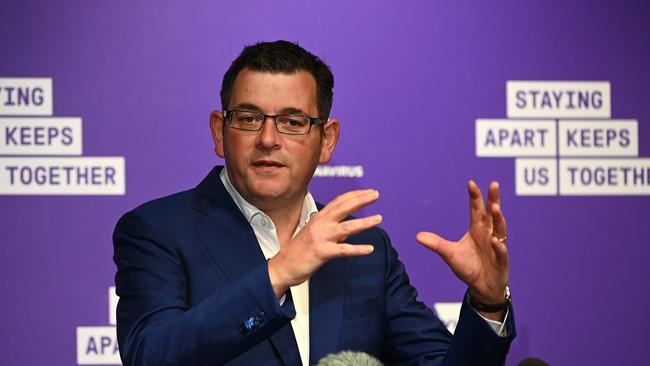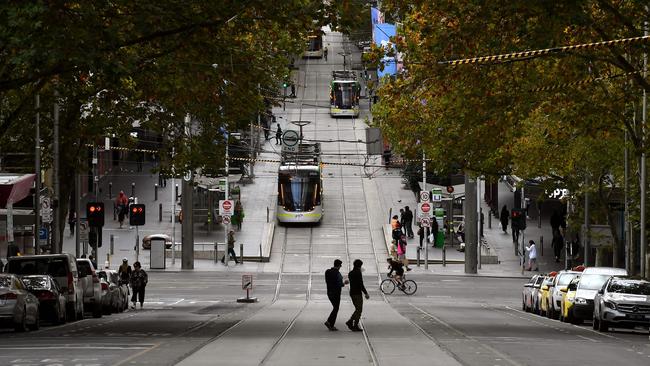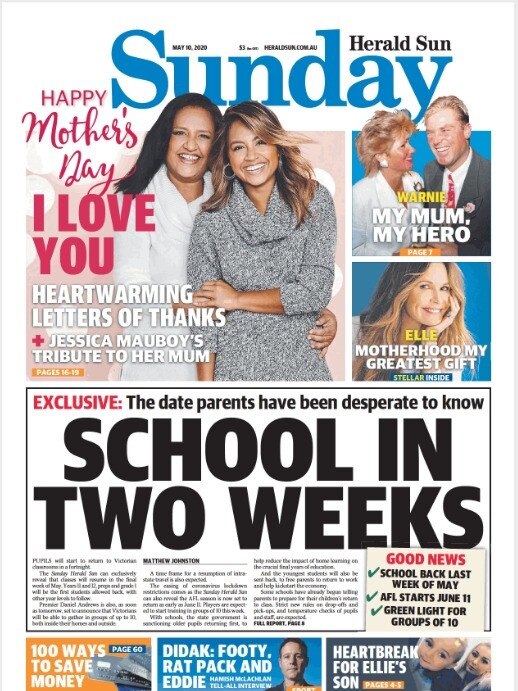Daniel Andrews announces return date for Victorian schools
Victoria’s plan to end to remote learning has finally been unveiled, with the first groups of students returning on May 26. And teachers have also welcomed the news, as strict measures will be implemented to keep the virus out of schools.
Coronavirus
Don't miss out on the headlines from Coronavirus. Followed categories will be added to My News.
This coronavirus article is unlocked and free to read in the interest of community health and safety. Get full digital access to trusted news from the Herald Sun and Leader for just $1 for the first 28 days.
Teacher’s groups have welcomed news that Victorian students will start to head back to school in two weeks.
In a staggered approach, Preps, grade 1 and 2 and year 11 and 12 students will end remote learning and go back to school on May 26.
From June 9, years 3 to 10 will join their schoolmates and return to the classroom.
All special schools will also reopen on May 26.
Catholic schools are expected to announce a similar timeline.
The details were exclusively revealed in the Sunday Herald Sun two days ago.
The Australian Education Union welcomed the two-week notice and pupil free day on May 25 to aid teachers to get organised for face-to-face learning, which would give schools “time to plan and prepare”.
The private schools’ teachers group, the Independent Education Union, said it supported a cautious return “providing that health and safety is the top priority, that vulnerable staff are fully protected and that there is genuine consultation at every level”.
“Schools will have to give careful consideration to every aspect of their operations to ensure that they are able to provide the safe working and learning environments that staff and students are entitled to,” an IEU statement said.
This morning, Mr Andrews said school drop offs and pick ups will be staggered, as will lunch breaks.
There will be no assemblies, sports, camps or excursions for Term 2.
Teacher workspaces will be separated and all teachers will return on May 25, with the exception of those over 65 or with a medical condition.
Adults, teachers and staff will have to follow social distancing measures.
Children with compromised immunity or those who have families with health issues will be able to seek advice and work through their options with schools.
Student who use public transport to get to and from school are being told to follow distancing.
“There will be specific arrangements for classes,” Mr Andrews said.
“Parents wanted notice. They didn’t want to wake up one day and then to be told that their kids need to be back at school the following day,” he said.
“This gives our teachers and staff, school communities time prepare to do this properly.”
TEACHERS WILL FACE CHALLENGES GOING BACK
Australian Education Union Victorian branch president Meredith Peace said staff would “do our best to ensure the transition to back to normal schooling is equally as successful” as distance education.
She said it would take a while for things to get back to a ‘new normal’.
“Getting students back to school in a staged way is a great first step, but it won’t be school as we’re used to it: we’re going to have to continue to take extra precautions and practice strong personal hygiene and social distancing, which will bring new challenges,” she said.
“Students will need to adapt to new arrangements in the playground, there won’t be the usual engagement between parents and teachers at pick-up and drop-off times and staff will not be able to meet together in larger groups, but this is a step in the right direction.”
Independent Schools Victoria chief executive Michelle Green said while the news was welcome, schools faced major challenges in returning to normal.
“While welcome, the return to school-based education will present its own challenges, to avoid disruption and to ensure the community benefits of recent restrictions are not jeopardised,” she said.”
While government decisions are not mandatory to be followed by the private sector, the independent schools’ peak body has recommended its schools follow the state sector.
Mr Andrews yesterday confirmed the government believed a “gradual, staged return to face-to-face learning is safe, cautious and appropriate”.
“We now believe that a gradual, staged return to face-to-face learning is safe, cautious and appropriate given the testing we’ve done and the circumstances we face,” Mr Andrews said yesterday.
Education Minister James Merlino said $45m will be spent on cleaning schools.
“There will be cleaning every day – disinfect cleaning, high-touch points, every single day throughout the course of the day at schools for the rest of this term and all of term 3,” he said.
Federal Education Minister Dan Tehan said today’s announcement was “wonderful news because we don’t want the coronavirus to take a year of our children’s education”.
“The evidence is clear that nearly half of Australian children and young people are at risk of adverse effects on their educational outcomes by being physically disconnected from school,” he said.
“If online delivery were to continue, low SES, students with complex learning needs including students with disability, and indigenous students would lose weeks of learning in numeracy and reading.”
“Today’s announcement that Victoria now has a plan to return to classroom teaching based on expert medical advice and with additional protocols in place to protect teachers is welcome news.”
RELATED NEWS:
AFL PLANS STUCK IN MESSY STATE OF PLAY
WHAT YOU CAN AND CAN’T DO IN VICTORIA NOW
SECOND WAVE COULD COST VICTORIA $1B EVERY WEEK
TREASURER IN ISOLATION AFTER COUGHING FIT
Treasurer Josh Frydenberg is in isolation awaiting COVID-19 test results after suffering a coughing fit while delivering an economic update to federal parliament today.
The senior Cabinet member sought medical advice from Deputy Chief Medical Officer Paul Kelly after his ministerial update.
He said he had a “dry mouth and a cough”.
“The DCMO advised me that out of an abundance of caution it was prudent I be tested for COVID-19,” Mr Frydenberg said.
“Following the receipt of his advice, I immediately left Parliament House to be tested and will await the result in isolation.
“I expect the result of my test to be provided tomorrow.”
Meanwhile, the treasurer's address to Parliament also came with an awkward coughing fit -- showing why it's important to remain vigilant around correct coughing etiquette. #COVID19au pic.twitter.com/LGgwvd5Lg8
— 10 News First (@10NewsFirst) May 12, 2020
Prime Minister Scott Morrison was sitting just meters from Mr Frydenberg when he was delivering his ministerial update.
The speech was interrupted by a coughing fit that lasted about a minute.
Mr Frydenberg coughed into his hands and his elbow at different points during the coughing attack in the House of Representatives.
The fit started just as he began spruiking the boost the government’s stimulus package was having on workers and employers.
“Too long a speech,” he said as he tried to stem the coughing.
He then tried to stop the coughing by drinking from a bottle of water.
“My voice has gone now. Sorry,” he said.
The Treasurer was due to appear on ABC’s 7.30pm program with Leigh Sales tonight.
Sales tweeted this afternoon that unfortunately Mr Frydenberg was unable to virtually join the show from isolation.
17 NEW CASES, 15 FINES HANDED OUT OVERNIGHT
Seventeen coronavirus cases have been confirmed overnight, with eight linked to the Cedar Meats outbreak.
Victoria’s Chief Health Officer Dr Brett Sutton also confirmed three more cases of community transmission have occurred.
“Other cases are under investigation but there are no new cases involving health workers,” he said.
The state’s total number of COVID-19 cases sits at 1509.
A third staff member from Fawkner McDonald’s has been confirmed, with the restaurant’s 92 employees tested as a precaution.
McDonald’s closed the restaurant to undertake a deep clean, with staff from other stores filling in when the Fawkner restaurant reopens.
All close contacts of confirmed cases have been contacted by the department and will remain in quarantine for 14 days.
Police have issued a further 15 fines to Victorians flouting stay at home orders.
In the past 24 hours, police conducted 792 spot checks across the state.
In one case, four people evading police in a car were caught and fined.
It comes as fresh coronavirus outbreaks will almost certainly become a feature of Victorian life over the coming months, however health chiefs are confident the returning community can strike a safe balance.
With potentially dozens of undetected community transmitted cases of COVID-19 still circulating in the state, health department efforts are set to focus on detecting and shutting down new clusters rather hoping to avoid them.

Of the 141,000 tests processed in the past two fortnight, 30 were found to be positive for coronavirus, including 24 with no known connection to other cases – or .02 per cent of those tested.
Although those rates would mean about 1200 adult Victorians have undetected coronavirus, the actual cases are likely to be far fewer because tests undertaken during the blitz were weighted towards those with symptoms.
Premier Daniel Andrews yesterday warned undetected cases were still circulating and easing restrictions had to met with caution.
“They are not connected to an outbreak, they are not connected to overseas travel,” Mr Andrews said.
Victoria’s Chief Health Officer Prof Brett Sutton said testing would become a daily feature of life for rest of the year, with 150,000 Victorians to be screened by the end of May to track coronavirus in the community.
“We will continue to see outbreaks. It only takes one case in a particularly vulnerable setting (and) significant transmissions occur,” Prof Sutton said.
“I think we are really discovering almost all of the cases that are out there, so in that sense it is reassuring that only 30 have been discovered.”
In a further safety net, Prof Sutton said sewerage would be tested in catchments across the state.
“Even if we are not getting cases notified to us, if we detect them in sewerage we know there are active cases out there,” he said.
Options to continuing to isolate elderly and other vulnerable members of the community to shield them from coronavirus have been rejected by Victoria after European efforts failed to cut fatalities, with Prof Sutton saying “low transmission across the board” was the only way to protect all groups.
While further details of the latest detected cases are needed for a full understanding of the state’s position, University of Melbourne Dean of Medicine Prof Shitij Kapur said Victoria was in “a rather good place” for the coming months – provided the community appreciated outbreaks were something they would have to cope with.
SECOND WAVE COULD COST VIC ECONOMY $1B A WEEK
Victoria’s economy would go backwards by a whopping $1 billion a week if restrictions were revived to tackle a second wave of the coronavirus.
But the first stage of unlocking the state is expected to drive $717 million in economic growth every month.
And if the full three-stage plan agreed by the national cabinet is implemented by Premier Daniel Andrews, Victoria will see $2.2 billion in monthly growth to recover from the crisis.
Treasurer Josh Frydenberg will ramp up the government’s push to kickstart the economy by detailing the new data on Tuesday — the day he was supposed to deliver the federal Budget.
Read the full report.

HIGH CORONAVIRUS RISK SUBURBS IN CITY’S WEST
Several western suburbs are among Melbourne’s most vulnerable to coronavirus outbreaks, based on age and chronic health conditions.
There’s currently 44 live coronavirus cases in Melbourne’s western suburbs.
Find out the risk where you live here.
TRUMP ORDERS STAFF TO WEAR MASKS
Donald Trump has ordered White House staff to wear masks after US Vice President Mike Pence’s press secretary tested positive for coronavirus infection last week.
“We’ve had just about everybody I’ve seen today has worn a mask,” Mr Trump said at a press conference, which ended abruptly when he clashed with two reporters and walked out.
ECONOMIC HIT OF VIRUS COULD BE FELT FOR YEARS
It will take nearly two years for Australia’s economy to recover from the impact of the coronavirus lockdown.
That’s according to a KPMG report, obtained by The Australian, which found the economy will not recuperate its losses until the September quarter of next year.
It will take two years for the hardest hit industries of hospitality, accommodation, air transport and retail trade to recover losses, the report found.
Read the full report.
VIRGIN STOCK FALL AS MARKETS DIP
The looming threat of a second wave of coronavirus infections has spooked traders and sent stock markets downwards on Monday (local time).
Early gains in key eurozone markets were lost by trading’s close, and London scraped into positive territory in the final minutes of trading as the pound weakened.

